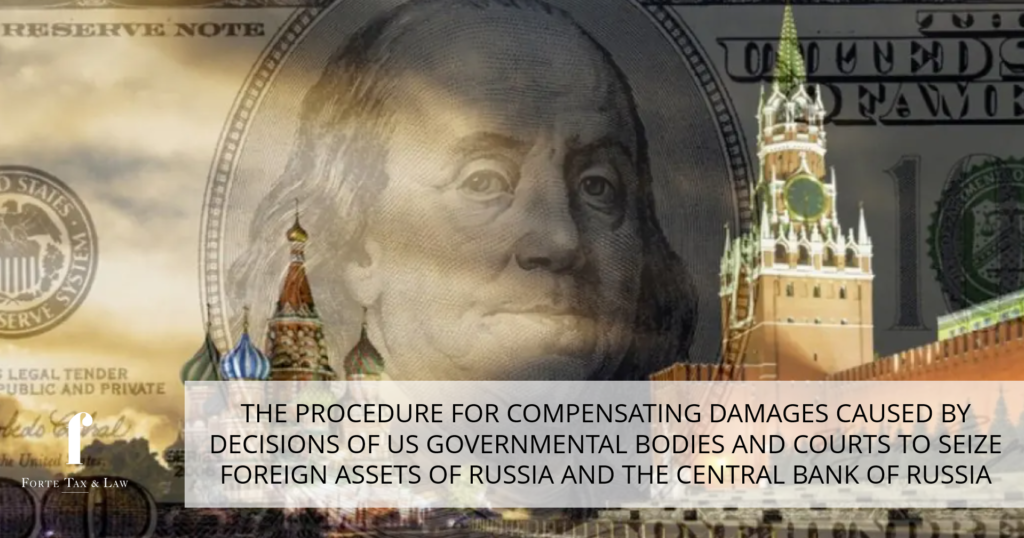Forte Tax & Law » News » The procedure for compensating damages caused by decisions of US governmental bodies and courts to seize foreign assets of Russia and the Central Bank of Russia
The procedure for compensating damages caused by decisions of US governmental bodies and courts to seize foreign assets of Russia and the Central Bank of Russia
On May 23, 2024, the President of Russia signed Decree No. 442, establishing the procedure for compensating damages caused by decisions of US governmental bodies and courts to seize foreign assets of the Russian Federation and the Central Bank of Russia. The decree may have significant implications for American companies and US citizens owning assets in Russia, as well as their Russian subsidiaries. It may also affect non-American companies that primarily operate in the US or are controlled by American entities.

Essence of the New Rules
If the Russian Federation or the Central Bank of Russia is unjustly deprived of rights to foreign assets by decisions of US governmental or judicial bodies, they can apply to a Russian court for compensation for the damage caused.
Compensation Procedure
The decree sets forth the following procedure for obtaining compensation. A Russian governmental body or the Central Bank may submit an application to a Russian court to establish the fact of unjust deprivation of property by a US governmental or judicial decision. If the court accepts the application and finds strong grounds to assume that Russia or the Russian Central Bank has been unjustly deprived of property rights, it sends a request to the Government Commission on Control of Foreign Investments in the Russian Federation to provide a list of property owned by the US or US persons that can be used for compensation.
Upon receiving such a request from the court, the Commission identifies property owned by the USA or US persons that can be used for compensation. Such property includes:
- Movable and immovable property located in Russia;
- Securities, shares in the charter (joint-stock) capitals of Russian companies;
- Property rights.
Based on the review of the application, the court decides either to establish the fact of unjust deprivation of rights and award compensation for the damage or to deny the application. If the compensation is awarded, the court’s decision terminates the rights to the property of the United States or US persons and transfers these rights to the Russian Federation or the Central Bank of Russia.
US Persons Whose Property is at Risk
US persons include US citizens or residents, entities registered in the US, and those who primarily operate or earn the majority of their income from activities in the US. Additionally, this category encompasses entities controlled by the aforementioned persons, regardless of their place of registration. This means that US persons include, among others, Russian or foreign subsidiaries directly or indirectly owned or controlled by US citizens and American companies.
Effective Date of the Decree
The decree comes into effect on the day of its official publication, i.e., May 23, 2024. However, the Russian Government must still develop the procedure for compiling a list of property belonging to the US and US persons and ensure the necessary amendments to Russian legislation within four months.
Our Assessment of the Decree
The decree lacks specific criteria for assessing the reasonableness of decisions made by US authorities or courts, leading to significant uncertainty in its application. Additionally, the decree’s constitutionality remains in question, especially regarding the potential confiscation of property from American entities and Russian companies with American shareholders in response to actions by US authorities or courts.
Recommendations
We recommend analyzing the ownership structure of assets and operations to determine the potential impact of the decree. Companies with American participation may want to consider restructuring the ownership of their Russian assets to minimize risks.
If you have any questions left or you would like to discuss something, please send an email to Anton Kabakov.
Sincerely,
